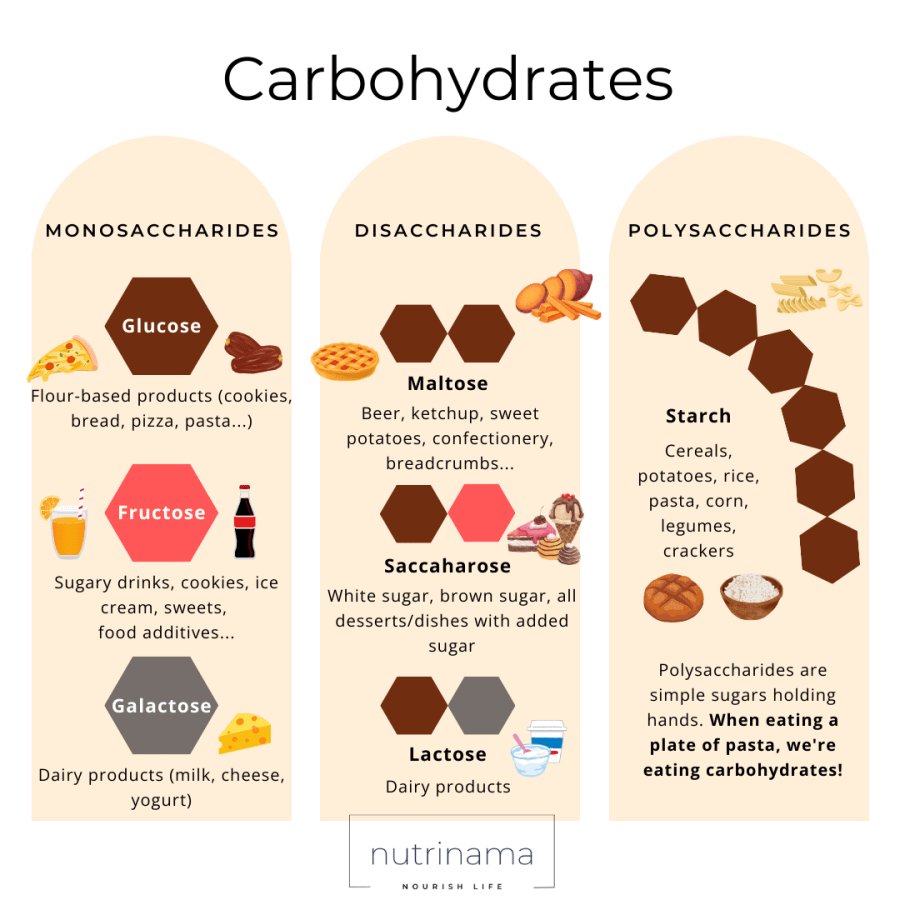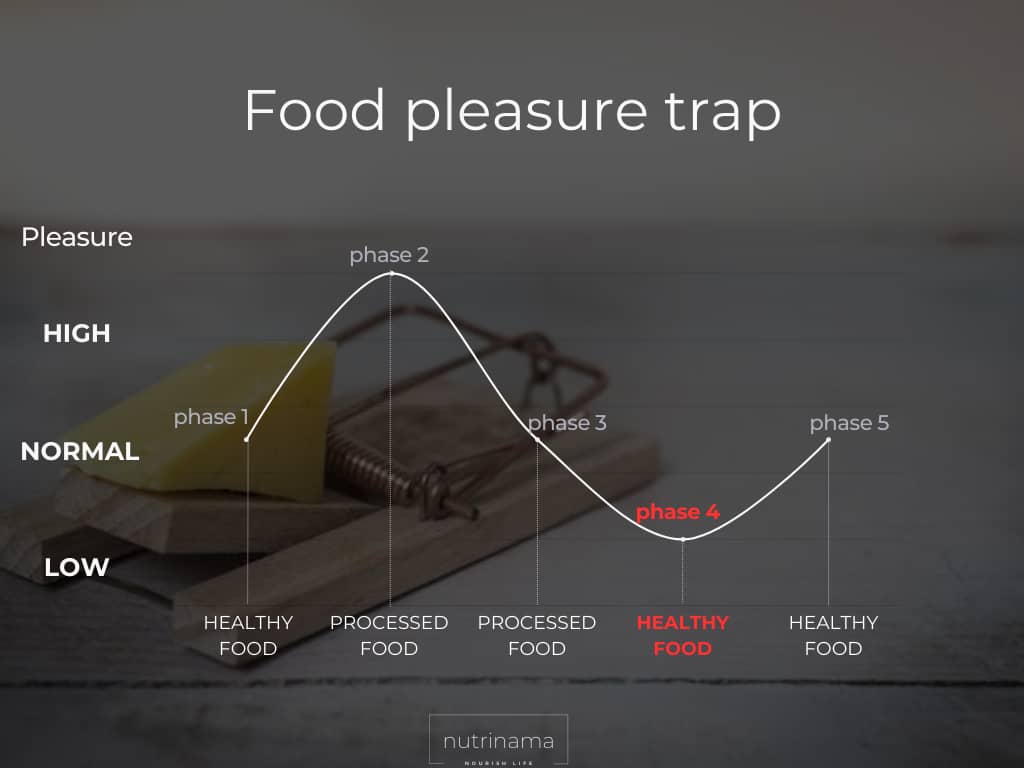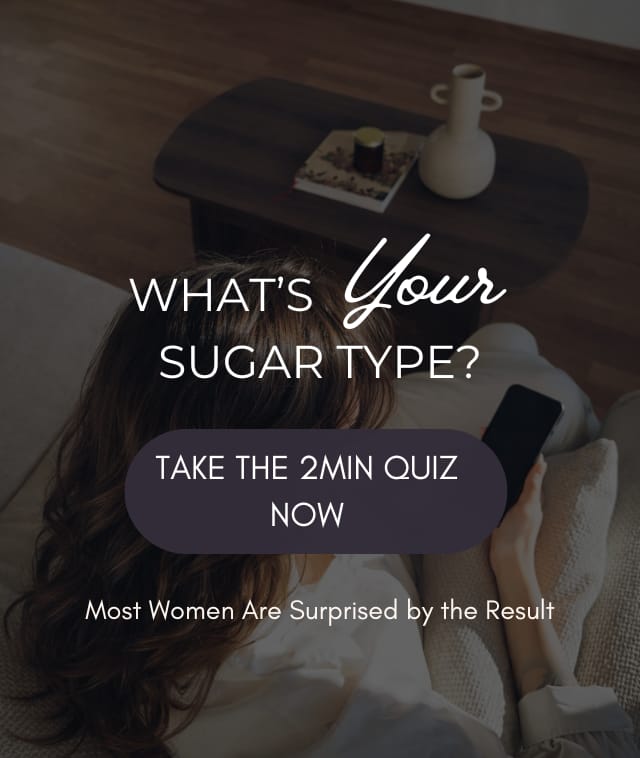Why can’t you quit sugar? You’ve probably tried cutting back on certain foods before, only to discover it’s way harder than it looks. Despite all your willpower and best intentions, those cravings just keep coming back.
Keep reading to find out why this happens and get some practical tips on how to finally kick your sugar habit.
After the night, the dawn.
Sugar: That Sweet Enemy
There’s a huge difference between being an occasional treat-lover and being completely hooked on certain foods. Our brains are wired to crave fatty, sugary foods, they’re energy-dense and supposedly meant to keep us alive.
The problem kicks in when we keep eating even though we’re not hungry anymore. We can’t seem to stop ourselves, we binge until sometimes our stomachs actually hurt. And it’s rarely the asparagus that’s the culprit…
We turn to these “comfort foods” that supposedly “soothe” us, temporarily masking negative emotions. But it’s really just a quick fix that actually disconnects us from what we truly need.
If you’re not sure whether you’re actually addicted or not, start by reading this article on sugar addiction.
Let’s begin by looking at these foods we find so hard to give up.
Sugar… what exactly are we talking about?
Most of my clients tell me they eat very little sugar. However, sugar definitely isn’t limited to just that white powder you sometimes put in your coffee. As I show in this illustration, sugar comes in many different forms.
So the starch found in what we commonly call “complex carbs” (bread, pasta, rice…) gets broken down during digestion into smaller glucose molecules.
Even though you don’t put white sugar in your coffee, when you eat these foods, you’re eating sugar!
It’s Not Your Fault
Why haven’t all those diets you’ve tried worked? How do you stay motivated when you’ve failed so many times already and every cell in your body is begging you to eat that donut?
You’ve certainly tried several times to get control of your sugar consumption. Each time you promise yourself it’s the last time, but the next day your promise only lasts a few hours. Despite your resolutions, you cave again.
However, this actually has nothing to do with your willpower! It’s not a motivation problem and you’re not any less intelligent than anyone else.
- A Hormonal Dysfunction
When we eat sugar, neurotransmitters like serotonin and endorphins are produced by our bodies. Serotonin is a hormone that promotes relaxation, a sense of calm, and therefore reduces anxiety. It’s worth noting here that 90% of serotonin is produced in the gut. Endorphins create a feeling of pleasure and have a euphoric effect.
No wonder that at the end of a stressful, exhausting day we throw ourselves at sugary foods to get even just a little relief from our discomfort!
There’s nothing abnormal about this behavior. We’ve simply learned to relieve stress and pain through the quickest and most readily available means: sugar.
If sugar gives you the impression of relief, you’re going to repeat this behavior over and over again. Food then becomes a form of self-medication and a way to regulate your mental and physical state.
Why don’t some people stop eating even once their stomach is full and they’ve gotten that relief? Food addiction happens when the pleasure from food becomes so euphoric that it overrides our natural instinct to stop eating at the right time.
Serotonin and endorphins are just examples. It could be a disrupted function of ghrelin (the hunger hormone), a lack of oxytocin (the “love hormone”), leptin resistance (the satiety hormone), too much cortisol (the stress hormone)…
In any case, don’t blame your inability to stop eating when it’s probably a biochemical dysfunction of the gut-brain axis.
- SO WHAT?
“So what?” you ask me. “Knowing this won’t stop me from eating too much chocolate!”
The truth is you have more power than you think. But it’s not about depriving yourself, because as we’ve seen, deprivation will only lead to more frustration and even more disturbed behavior around food.
The problem isn’t your lack of willpower but the method you’re using. Imagine you’re in a prison cell. You want to escape and someone tells you that you can open the door by pushing at a specific spot. You gather all your strength and push as hard as you can. The door moves a little but you’re exhausted and the door closes again.
Now someone tells you that you were pushing on the wrong side of the door, where the hinges are. If you push on the other side, the door will open easily.
Would you make another attempt or would you continue thinking that escape is impossible?
Why It’s So Hard to Break Free
-
We Can’t Just Stop Eating
Unlike alcohol or nicotine, we can’t just quit everything cold turkey. The line between foods that make us addicted and those that aren’t addictive isn’t always clear and, let’s face it, is very personal.
Generally speaking, you’ll need to learn to navigate between foods that make you feel good and those that trigger sugar binges and keep you dependent. Every time you eat, you’ll have to make a conscious, healthy choice. This isn’t easy in our environment of toxic food everywhere.
It’s like asking an alcoholic in recovery to walk into a bar and order a glass of water. It’s not easy, especially at first.
-
Your Social Circle
“Your diet is too restrictive.” “You need to eat a bit of everything.” “A little piece won’t hurt you.” This attitude that pushes you to eat is everywhere.
If only they knew… It’s not their fault. The people who push you more or less consciously to eat aren’t aware of the serious consequences of addiction. They might be denying their own dependency or don’t want to see you being different.
Plus, sharing meals together is deeply rooted in our culture. It’s especially a time when we create social bonds. With friends or family, we like to associate food with the time we spend together.
An alcoholic who stops drinking isn’t just refusing alcohol, but also the experience of fuzzy-headed conversations, the bar where everyone knows his name, the circle of drinking buddies…
Refusing a slice of birthday cake and managing to keep that sense of belonging to the group without eating food that’s harmful to you is a real challenge.
The truth is, good times are there because we create emotional connections, not because we binge on sugar together. Learning to create relationships without associating them with an addictive substance is difficult and probably requires rewriting your way of being in the world.
The First Days Are the Hardest
As human beings, we all seek pleasure. Not only do we seek pleasure, but we seek the quickest and easiest way to get it. Be careful not to fall into the trap though!
In our original state, we’re supposed to enjoy food within the normal pleasure range. This is phase 1.
In phase 2, we introduce sugar, often in the form of processed foods, into our diet. Through the secretion of hormones (serotonin, endorphins, dopamine…), the sensation of pleasure skyrockets. This food has more energy and since we’re programmed to seek energy-rich foods for survival, our body thinks this is certainly a good thing to do. We memorize this sensation and repeat it, over and over again.
Regular consumption of these processed foods, however, doesn’t bring more pleasure in the long term. It’s actually the opposite! We get used to larger doses over time.
Phase 3 is neuro-adaptation. We develop the habit of consuming this very rich and overly sweet food daily to the point where the doses become significant over time to get the same pleasure. We gain weight and accumulate symptoms of metabolic disorders. Although the amount of sugar consumed increases, wellbeing decreases.
Finally, we decide to get back on track and eat healthy foods again. This is when things become difficult.
When we move from phase 3 to phase 4, our body interprets this as an alarm signal. Previously, we provided it with easy and quick energy and dopamine. Now there’s much less. Our body works against this rational decision. Without getting our fix, the body calls us to find that easy pleasure again and sabotages all our conscious efforts to eat better!
Short-term discomfort is therefore completely normal in phase 4. But it can last for weeks and you often feel cravings, mood swings, irritation… In short, it’s not a pleasant prospect. This is why many people abandon their efforts during this phase and return to their old habits before reaching phase 5 of serenity.
The Secret
However, it’s entirely possible to shorten this period and reach phase 5 where you feel good with healthy food more quickly. The key is a mindset shift.
Many people think they’ll miss desserts, ice cream, cakes, bread… (substitute your favorite). They imagine them as comfort or pleasure so that the idea of going without creates resistance in the mind and perpetuates the diet mindset. The stronger the resistance, the more it intensifies the feeling of discomfort.
When we understand that by stopping consumption of foods that harm us we’re not giving up anything, quite the contrary, we’re actually regaining freedom, it’s possible to reduce this resistance, or even feel relief at no longer being dependent.
Let’s stop seeing only the pleasure and talk about the danger of overconsumption. In Switzerland, we now consume 110 grams of added sugar per day. That’s 4 times more than what the WHO recommends, which advises reducing free sugar intake to less than 5%! This alarming consumption is partly due to hidden sugars in our foods.
Desire is not hunger.
Pleasure is not happiness.
We have to acknowledge that we’re alone facing the astronomical budgets of agro-food groups who have every interest in keeping us dependent on their products.
Like the tobacco industry before them, food industry giants work in the shadows to slow regulations on their products, don’t acknowledge the addiction these can cause, and blame the consumer and their “lack of willpower.”
It’s worth noting that to this day there are no regulations concerning overly sugary drinks or other “treats” when it comes to advertising targeting children. Young audiences are all the more vulnerable to these products because they don’t have perspective on the compulsive behaviors that sugar consumption can lead to long-term.
Food manufacturers have children test products before marketing them to find the taste that will sell best. By using attractive cartoon characters, toys, and other marketing strategies, they develop loyalty to their products from the youngest age.
Most of my clients remember eating sweets in secret or even stealing money to buy them as early as 6-7 years old. Today they’re fighting an addiction that isn’t even recognized by society.
Unless you’re completely convinced of the harmfulness of these products, it can be difficult to extract yourself from the omnipresence of visual triggers (enticing packaging), auditory (radio advertisements), olfactory (sweet smells in the supermarket)… that constantly trigger our sugar cravings.
Addiction is a very lucrative market. The earlier we get hooked, the more profitable we become.
Our brain is not adapted to manage the current abundance of overly rich processed food in the Western world. Just as we once ate to survive, today we must learn to navigate the jungle of products that are anything but natural yet increasingly tempting.
In addition to our environment, we must pay more attention to our own feelings and treat our needs with kindness.
The Moderation Problem
Do you know how to moderate yourself or are you more “all or nothing”?
We all know someone who can apparently control themselves very well. A colleague manages to limit herself to 2 squares of chocolate each afternoon and doesn’t seem to want to devour the entire bar. A friend follows the 80/20 rule and allows himself some cheat meals on weekends. A gym trainer eats 250 grams of carbs per day without gaining weight.
We probably all have moderators in our circle.
In fact, most nutritionists and other health professionals think everyone should eat a bit of everything, exercise, and learn to better manage their emotions.
That said, just because a moderator can control their alcohol consumption doesn’t mean alcoholism isn’t a reality for others.
Similarly, although sugar addiction isn’t yet recognized by the scientific community, binge episodes and distress are very real for my patients.
If you try to moderate while you’re dependent, you’ll go in circles. Try to limit yourself to 2 donuts instead of your usual 6 and you can be sure all your attention will be focused on those 4 remaining donuts. Sooner or later, your brain will find an excuse to eat them. It’s a bit like suggesting an alcoholic limit alcohol to Saturday nights only or drink only beer.
So how do you do without something without feeling deprived or like you’re making a sacrifice?
Completely refusing to consume foods that make you addicted saves energy. Since you’ve already made your food choice, there’s no more decision to make (no torturing yourself over whether to eat 2 or 4 squares of chocolate, for example).
You don’t need to make drastic changes overnight. You could, for example, start by no longer consuming sugary sodas. Then exclude processed food, then flour-based products, etc.
If you’re “all or nothing,” it will be easier for you to abstain completely rather than try to control a situation that is, in principle, uncontrollable.
This isn’t a strategy that works for everyone. Identify what stage you’re at in your addiction. If you can no longer hear your own voice and your addicted alter-ego has taken over completely, consider seeking help.
Copyright ©Nutrinama Ekaterina Choukel
The contents of this blog, including text, images and statistics as well as any other material on this website (referred below as “content”) are for informational purposes only. The content is not intended to be a substitute for medical diagnosis and/or treatment and is not suitable for self-administration without the knowledge of your doctor. Do not disregard medical advice and always consult your doctor for concerns you might have regarding your health condition or before acting on anything you have read or heard in our content.




